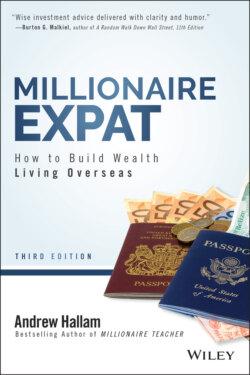Читать книгу Millionaire Expat - Andrew Hallam - Страница 31
Hedge Fund Money Spanked for Its Con
ОглавлениеGrabbing Warren Buffett's gauntlet in 2008, New York asset management firm Protégé Partners bet history's greatest investor that five handpicked hedge funds would beat the S&P 500 index, a large US stock index, over the following 10 years. Protégé Partners selected five hedge funds with index‐beating track records (each was actually a fund that contained winning hedge funds within it). But historical results are rarely repeated in the future.
The bet began in 2008. Stocks crashed that year, so it should have been a great year for hedge funds. If the fund managers could have predicted the crash, they would have pulled far ahead. But that didn't happen. In the years that followed, the S&P 500 ran like an Olympic Kenyan marathoner from a pack of pudgy men.
By January 2018, Buffett had won. Vanguard's S&P 500 Index gained 98 percent. The hedge funds were up just 24 percent. In fact, none of the funds of hedge funds kept pace with the S&P 500.15
If you've read Simon Lack's book, The Hedge Fund Mirage, these results won't surprise you. He says hedge funds produce horrible returns. Lack reveals that a portfolio balanced between a US stock index and a US bond index would have beaten the typical hedge fund in 2003, 2004, 2005, 2006, 2007, 2008, 2009, 2010, and 2011.16 After his book was published, hedge funds continued to underperform the balanced stock and bond index in 2012, 2013, 2014, 2015, 2016, 2017, 2018, 2019 and 2020. In other words, a balanced stock market index beat the Masters of the Universe for 18 straight years…and counting.17
In fact, the hedge fund managers' shortfall was so poor that the managers could have worked for free (not charging their usual 2 percent per year plus 20 percent of any profits) and a balanced US index fund would have still given them a beating.
The global stock market index (which includes US and international stocks) also beat hedge funds to a pulp. Consider the hedge fund industry's failure to beat portfolios of market indexes. If they can't do it, what chance does your financial advisor have? If your advisor has Olympian persistence, you might hear this:
You can't beat the market with an index fund. An index fund will give you just an average return. Why saddle yourself with mediocrity when we have teams of people to select the best funds for you?
If the average mutual fund had no costs associated with it, then the salesperson would be right. A total stock market index fund's return would be pretty close to average. In the long term, roughly half of the world's actively managed funds would beat the world stock market index, and roughly half of the world's funds would be beaten by it. But for that to happen you would have to live in a fantasy world where the world's bankers, money managers, and financial planners all worked for nothing—and their firms would have to be charitable foundations.
If your advisor's skin is thicker than a crocodile's, you might hear this next:
I can show you plenty of mutual funds that have beaten the indexes. We'd buy you only the very best funds.
The SPIVA Persistence Scorecard proves that selecting mutual funds based on high‐performance track records is naïve. Twice a year, the firm looks at the top performing actively managed funds: those that are among top 25 percent of performers. Then they wait a couple of years and determine what percentage of those winning funds remains among the top 25 percent of performers. Typically, about 75 percent of those “top‐performing” fall from grace after just two years.18
Neither you nor your advisor will be able to pick the funds that will win over the next year or decade.
If the salesperson's tenacity is tougher than a foot wart, you'll get this as the next response:
I'm a professional. I can bounce your money around from fund to fund, taking advantage of global economic swings and hot fund manager streaks, and easily beat a portfolio of diversified indexes.
Sadly, many investors fall victim to their advisor's overconfidence. Instead of building diversified accounts of index funds, they build portfolios with actively managed funds that are on a hot streak. But the results typically lead to underperformance or disaster.
